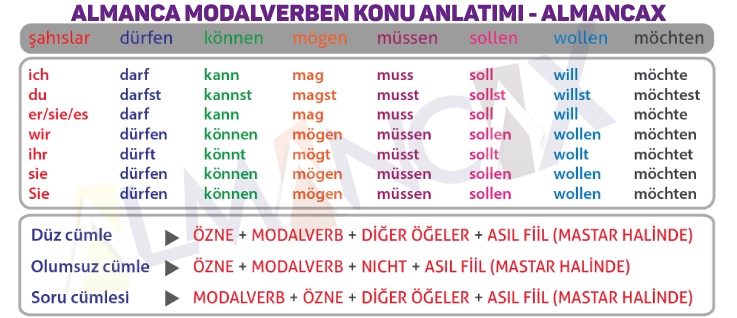German Modalverben Lecture

Dear friends, in this German lesson modalverben We will cover the subject. In german modalverben called 6 auxiliary verbs has. These are called Modalverbens or style verbs. Although these auxiliary verbs do not make sense on their own, they change or expand the meaning of the actual verb of the sentence.
German modalverben These auxiliary verbs, which are called, are conjugated according to the subject in the sentence, and in this case, the actual verb of the sentence is found in the infinitive, that is, at the end of the sentence without conjugation.
These verbs can also be used as the main verb in the sentence. These verbs, called Modalverben in German, and their general meanings and their conjugations according to individuals in the present tense are given below. In the table below modal modalverbi When it is used to mean want-to desire, it is mostly used as möchten instead of mögen in daily life. For this reason, the conjugations of the verb möchten, besides the modalverbs, are given next to the table.
So what meaning does Modalverben add to the sentence? Are there modalverben style auxiliary verbs in our Turkish?
Of course there is. Similarly, let's give you examples as follows:
I want to go home.
I want to eat cake.
I can swim in this pool.
I can fix this car.
I can sing.
I can ride a bike.
I can run fast.
You can use sentences as above in German. modalverben We can simulate sentences created using.
Now let's learn about these auxiliary verbs called modalverben in German and their meanings.
|
MODALVERBEN |
|
| allowed | to be allowed to do, to be able, to be able, to dare, to |
| can | to be able, to be able, to know, to understand, to have abilities, to be able, to be able |
| mögen | to want, to love, to like, to be inclined, to like, to desire, to be |
| have | have to do, have to do, have to do, should / should |
| shall | to be asked to do, to be required, to be required, to be asked to |
| want to spend | want, desire, demand, be in need |
Almanca modalverben that is, auxiliary verbs are as above. As you can see here, there are small differences in meaning between Modalverbens. e.g allowed to be able to act, to have permission and license to do it, to have permission, which means the same can It is used to mean to be able to act, to have power and power, to have skill, to be able to.
|
ATTACHMENTS ACCORDING TO THE GERMAN MODALVERBEN PERSONS |
||||||
| PARTIES | allowed | can | mögen | have | shall | want to spend |
| ich | may | can | mag | set a link from your homepage to Fewo-von-Privat.de | soll | will |
| du | darfst | kannst | magst | musst | sollst | willst |
| er / sie / es | may | can | mag | set a link from your homepage to Fewo-von-Privat.de | soll | will |
| we | allowed | can | mögen | have | shall | want to spend |
| her | dürft | könnte | mögt | musst | solt | wollt |
| they | allowed | can | mögen | have | shall | want to spend |
| you | allowed | can | mögen | have | shall | want to spend |
The table above modalverbenThe shots of the people are given. In order to use modalverbens correctly in sentences, modalverbenIt is necessary to memorize the shots of the people according to the individuals. We can also see this table as a larger visual:
German Modalverbens are as above. These Modalverbens are mostly used in sentences with the main verb. Modalverbens in sentences they are attracted to the subject and in this case actual verb of the sentence gauge Yani without shooting found at the end of the sentence. Modalverbens can also be used as the main verb in a sentence. In this case, they are normally located where the verb should be.
Above modalverben We gave the conjugations, so if we are going to use the modalverben and the real verb in a sentence, in a sentence, modalverben And if a real verb is to be found, then Modalverben will be conjugated according to the subject, and the real verb will be at the end of the sentence as infinitive without inflection. We have already seen what the infinitive form of a German verb is and how a verb is conjugated in German according to individuals, in our German verb conjugation lesson. Those who do not know can read that lesson.
Now let's write some sample sentences in German parallel to our explanations.
German Modalverben Sample Sentences
Table of Contents
Let's write straight sentences using modalverben
SUBJECT + MODALVERB + OTHER ITEMS + ORIGINAL VERB (IN CASE OF MASTER)
ich kann schwimmen
I can swim.
du kannst schwimmen
You can swim.
Mary's blood.
Meryem can run.
Wir kannen rennen.
We can run.
Let's write question sentences using Modalverben
Kannich schwimmen?
Can I swim?
Kannst du schwimmen?
Can you swim?
Kann Ahmet Rennen?
Can Ahmet run?
Kannen wir rennen?
Can we run?
Let's write negative sentences using Modalverben
Ich kann nicht schwimmen.
I can not swim.
Du kannst nicht schwimmen.
You can't swim.
Mehmet kann nicht rennen.
Mehmet cannot run.
Wir kannen nicht rennen.
We cannot run.
Mixed sentences about Modalverben
Now let's make up mixed sentences, our sentences can be translated into Turkish as present tense or present tense. for example ich kann rennen sentence "i can run"As" or "I can runWe can translate as ”.
Here we go Kaffee trinken.
I don't want to drink coffee.
Möchtest du Pizza essen?
Do you want to eat pizza?
Wir möchten ins Theater gehen.
We want to go to the theater.
Ihr mochtet ein Buch lesen.
You want to read a book.
Ich kann schon malen.
I can paint beautifully.
Er blood gut Auto fahren.
He can drive well.
Wir können schnell rennen.
We can run fast.
Sie kann nicht schwimmen.
He cannot swim.
Ich kann nicht so früh aufstehen.
I can't get up early in the morning.
Du kannst Klavier spielen und singen.
You can play the piano and sing.
Dear friends, in this lesson, we taught Modalverbens, which is an important topic in German, we saw Modalverbens in German, we learned how to shoot Modalverbens according to individuals, modalverben using straight sentences, question sentences and negative sentences.
You too modalverbenYou can make different sentences with different verbs by using 's.
In this way, you can learn the subject of Modalverben much better and you will not easily forget the subject of Modalverben thanks to plenty of repetitions.
German Modalverben You can write any questions, opinions, suggestions and requests you want to ask about the subject in the question field. All questions will be answered by us.
Dear friends, do not forget to announce and recommend our German learning site to other friends.
Thank you for visiting our site, we wish you all the best.


